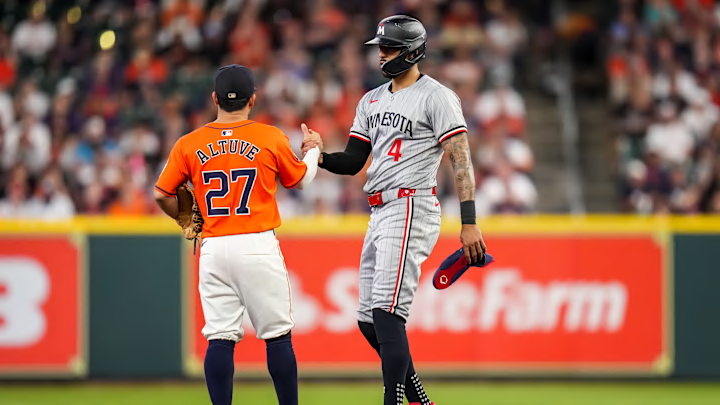The Houston Astros' need for another infield bat only ratcheted up after Isaac Paredes went down with a hamstring injury the team has deemed "significant". Jose Altuve's shift to the outfield this year already left a glaring hole at second base; now, with Paredes out for an extended period of time and even shortstop Jeremy Pena still not back from a rib injury, it's become something of a four-alarm fire.
That's never a good place to be with less than 48 hours to go until the July 31 trade deadline. They say that desperate times call for desperate measures, and apparently Houston's desperation has led them to consider something truly shocking: a reunion with current Minnesota Twins shortstop Carlos Correa, whom USA Today's Bob Nightengale reports the team is "exploring the possibility" of acquiring. (Lest you understandably have some doubts about Nightengale's track record, MLB.com's Brian McTaggart also confirmed the Astros' interest here.)
The six-year, $200 million contract Correa signed with Minnesota ahead of the 2023 season contains a full no-trade clause, but Nightengale claims that the infielder has expressed a willingness to waive it for a return to Houston. And there is, admittedly, a romanticism here: A star returning to the team that drafted him No. 1 overall back in 2012, the team he helped lead to its first World Series title five years later. Plus, he does fill a big need for a slumping Astros lineup as they look to hold off the hard-charging Texas Rangers and Seattle Mariners in the suddenly crowded AL West.
But GM Dana Brown and Co. should avoid letting their hearts guide their heads here. Sure, Correa coming back home would make for a great headline, and this team needs to come away with at least one more bat in the next day or two to shore up its pennant chances. But that bat should not, under any circumstances, be Correa, a choice that could cost Houston both its present and its future.
For more news and rumors, check out MLB Insider Robert Murray’s work on The Baseball Insiders podcast, subscribe to The Moonshot, our weekly MLB newsletter, and join the discord to get the inside scoop during the MLB season.
Carlos Correa reunion would hurt the Astros in both 2025 and beyond
Let's start with the present. Correa has been warming up a bit at the plate recently, slashing .300/.388/.371 in the month of July. But his power has plummeted, with just seven homers in 93 games so far, and he's still got a 93 OPS+ for the year. He's also regressed a bit in the field, coming in at -2 Outs Above Average at short this year per Baseball Savant. As he gets set to turn 31 in September, it's fair to wonder how much more of his prime Correa has left, and what that looks like.
It's also worth pointing out that he doesn't actually solve Houston's biggest need. Yes, Correa is an infielder, and the Astros certainly need one of those between now and the deadline. But he would be yet another right-handed hitter in a lineup currently full of them; hardly any team has dedicated more at-bats to righties than Houston this year, which is why they've been linked to lefty bats like Brendan Donovan and Brandon Lowe in recent days.
Given all that, it's unclear whether Correa would actually move the needle for Houston down the stretch of this season. And if he doesn't, suddenly the Astros will be left with one whale of a contract: Correa's deal comes with three more guaranteed seasons at around $32 million per year, then has four more option years that will vest if he accrues enough at-bats to activate them. The earliest the Astros could get out of this would be in the winter of 2028, at which point Correa will be entering his age-35 season.
All of this, just as the Astros are about to finish the long, painful process of clearing out their books. Framber Valdez feels as good as gone this winter, after already saying goodbye to fellow franchise icons Kyle Tucker and Alex Bregman. The upside of all that turnover was the chance to finally dip back into the market in a big way this winter; taking on Correa's money would greatly reduce the team's flexibility, all for a player who might no longer be capable of playing at an All-Star level. You can understand why the Astros would at least consider this possibility, but they're better off steering clear.
